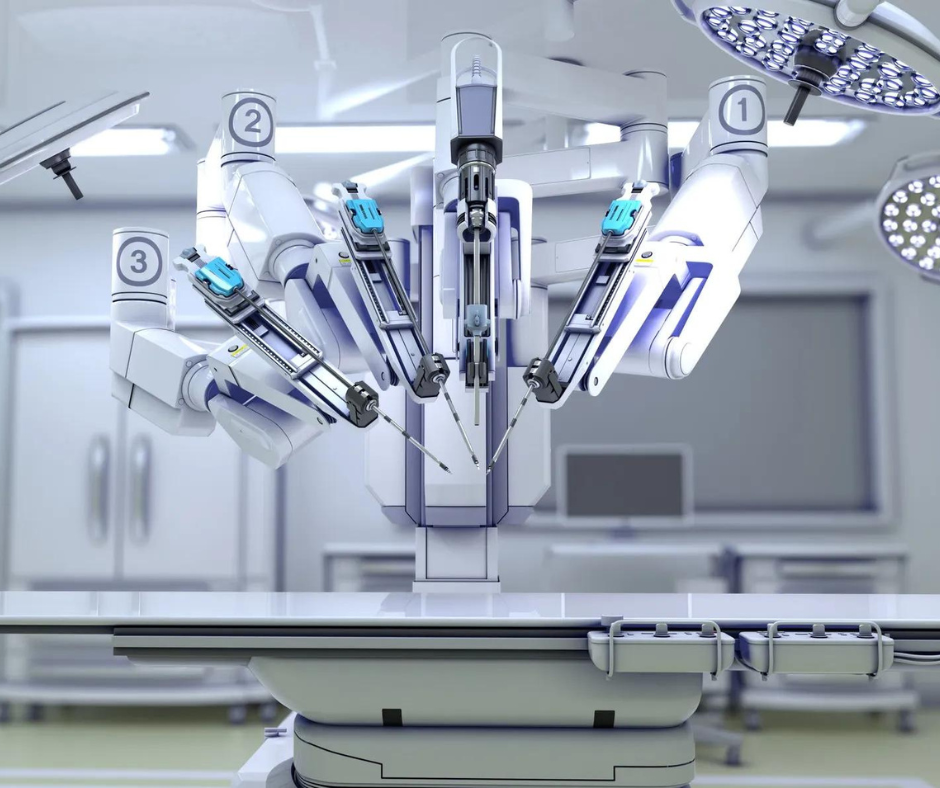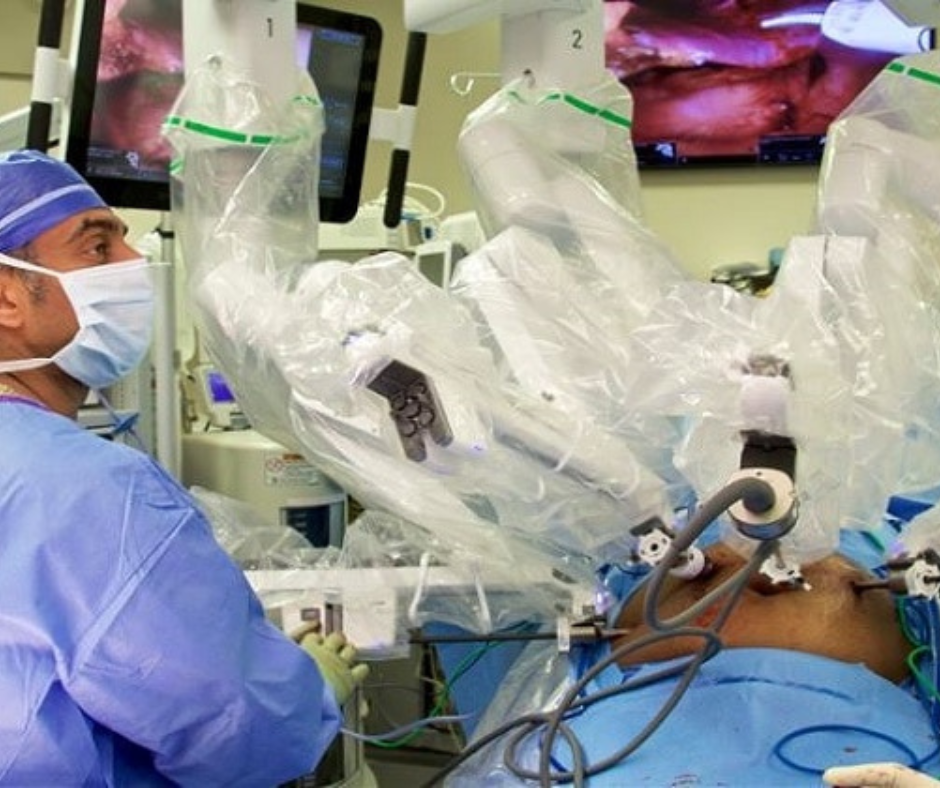Robotic Bariatric Surgery

Bariatric surgery is a highly effective procedure to achieve sustained weight loss for individuals with a high Body Mass Index (BMI) and other medical conditions related to obesity. Advancements in surgical techniques have led to the development of minimally invasive surgery, which can be done through traditional laparoscopy or robotic surgery. Robotic bariatric surgery, also known as robotic-assisted surgery, is a surgical assistance tool that enables bariatric surgeons to perform weight loss surgery using computer-guided, magnified, 3-D visualization. The da Vinci Robot is a commonly used robotic surgical system in bariatric surgery.
Types of Robotic Bariatric Surgery
There are various types of robotic bariatric surgery that are performed using the da Vinci Robotic Surgery System, including:
Robotic gastric bypass surgery shrinks the stomach size and reroutes the digestive tract. During surgery, doctors divide the stomach to create a new, smaller stomach. The new stomach is attached to the small intestine and bypasses the larger part of the original stomach. The new stomach is now much smaller, which reduces the amount of food it can hold. The robotic system provides surgeons with a 3D HD view inside the patient’s body and wristed instruments that bend and rotate far greater than the human hand, enhancing vision, precision, and control.
During robotic gastric sleeve surgery, also known as sleeve gastrectomy, most of the stomach is removed, leaving behind a smaller, sleeve-shaped stomach that can only hold smaller amounts of food. The robotic system provides surgeons with a 3D HD view inside the patient’s body and wristed instruments that bend and rotate far greater than the human hand, enhancing vision, precision, and control.
Who is a Candidate for Robotic Bariatric Surgery?
Individuals with a BMI over 40 or over 35 in combination with medical conditions such as diabetes or high blood pressure may be candidates for robotic bariatric surgery. The increased visualization that the robotic system offers gives the surgeon more control over movements for the severely obese patient.
Compared to conventional laparoscopic weight loss procedures, robotic bariatric surgery may offer patients numerous potential benefits, including:
- Reduced pain and scarring
- Quicker recovery
- Fewer complications
- Less trauma to the body
- Lower infection rates
- Shorter hospital stays
- Lower risk of needing follow-up surgery
- Much lower rate of gastrointestinal leaks
The use of robotics provides superior visualization, more degrees of freedom, and better ergonomics. The surgeon is in complete control throughout the surgery, and the robotic system enables the surgeon to perform precise maneuvers.

Risks of Robotic Bariatric Surgery
- Leaking from the area where bowel was reconnected during surgery
- Leaking from the area where bowel was cut
- Dehydration
- Nutrition deficiencies
- Food moves too quickly from stomach into small intestine
It is important to discuss the potential risks and benefits of robotic bariatric surgery with your surgeon.

Recovery from Robotic Bariatric Surgery
Most patients who have robotic bariatric surgery can expect a two- to three-week recovery period after surgery. Rest is critical during the recovery period to allow your body to heal. It is also important to follow your doctor’s instructions on how many calories you should be consuming during this period. You should not exercise during the recovery period. Collaborate with your bariatric surgeon and weight loss team to develop a plan to gradually start an exercise program.
Comparison of Robotic Bariatric Surgery with Laparoscopic Surgery
Robotic bariatric surgery and laparoscopic surgery are both minimally invasive techniques, but robotic surgery offers superior visualization, more degrees of freedom, and better ergonomics. A review of published literature on the outcomes and complications of bariatric surgery using a robotic platform showed that the use of robotics led to similar or lower complication rate in bariatric surgery when compared with laparoscopy. Two studies found a significantly lower leak rate for robotic gastric bypass when compared to laparoscopic method. The learning curve for RYGB seems to be shorter for robotic technique. Three studies revealed a significantly shorter operative time, while four studies found a longer operative time for robotic technique of gastric bypass. The application of robotics in bariatric surgery seems to be a safe and feasible option. Use of robotics may provide specific advantages in some situations and overcome limitations of laparoscopic surgery. Large and well-designed randomized clinical trials with long follow-up are needed to further define the role of digital platforms in bariatric surgery.
The cost of robotic bariatric surgery can vary depending on the individual patient’s needs, the type of surgery, and the hospital where the surgery is performed. In India, many hospitals offer affordable robotic bariatric surgery options. It is important to discuss the cost of the surgery with your surgeon and insurance provider before proceeding with the surgery.
India has emerged as a preferred destination for robotic bariatric surgery due to the availability of world-class hospitals and highly skilled surgeons at a fraction of the cost of surgery in western countries. Hospitals in India offer advanced robotic bariatric surgery procedures, including gastric bypass, gastric sleeve, and revisional bariatric procedures. The cost of robotic bariatric surgery in India is significantly lower than in western countries, making it a cost-effective option for individuals seeking weight loss surgery.
Conclusion
Robotic bariatric surgery is a breakthrough in weight loss procedures that offers superior visualization, more degrees of freedom, and better ergonomics. It is a safe and feasible option that provides numerous potential benefits, including reduced pain and scarring, quicker recovery, fewer complications, and shorter hospital stays. Individuals with a BMI over 40 or over 35 in combination with medical conditions such as diabetes or high blood pressure may be candidates for robotic bariatric surgery. The cost of robotic bariatric surgery can vary, and hospitals in India offer affordable options for patients seeking weight loss surgery. It is important to discuss the potential risks and benefits of robotic bariatric surgery with your surgeon to determine if it is the right option for you.

